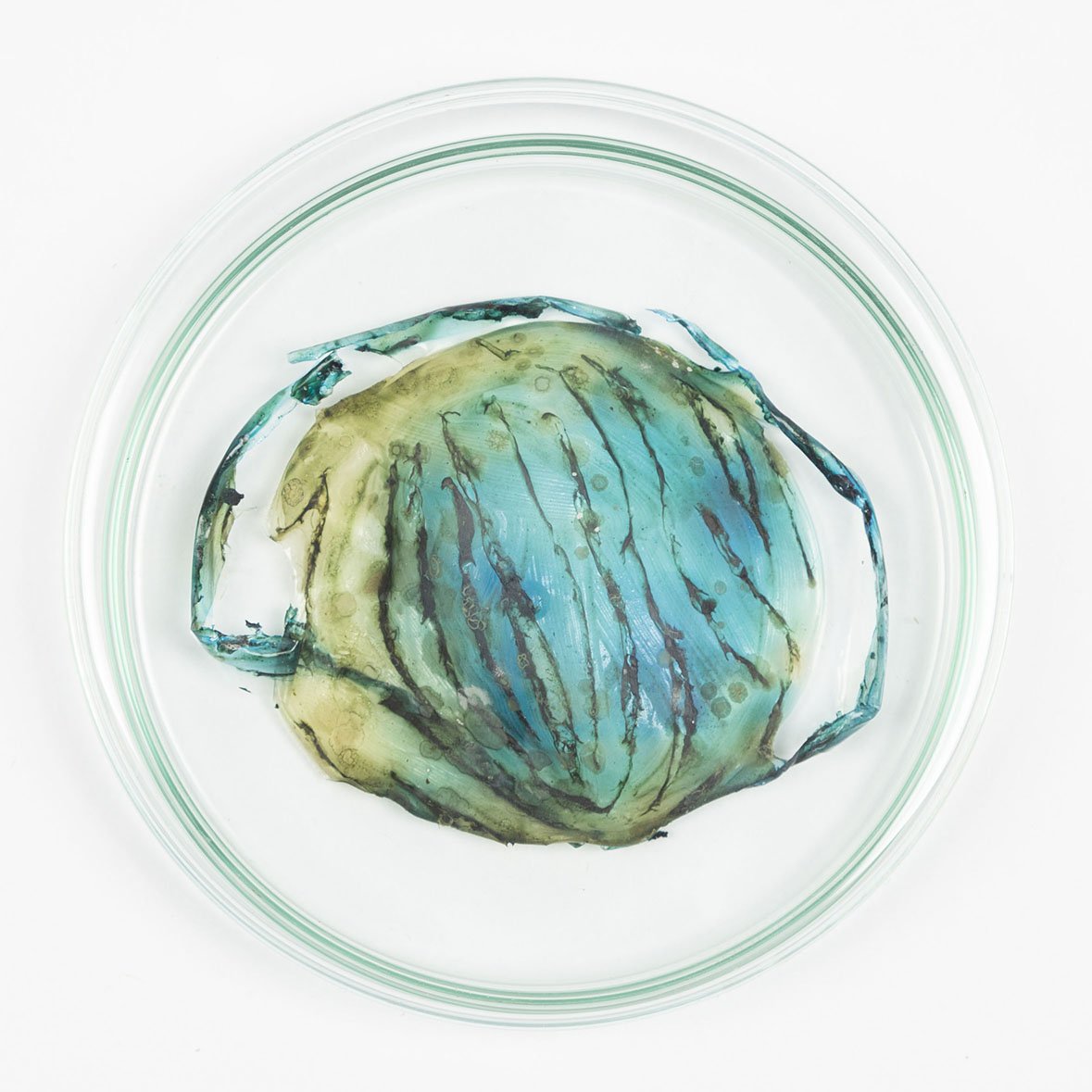
Collective Exhibitions
Lettmann, S., White, B. and Hillyard, Z. (2024) Constructive Disruption 1.0: a sensory intervention to explore fashion futuring. Exhibition Dialogical Bodies conference. Boras, SWE, 19 - 20 April 2024. Boras: The Swedish School of Textiles.
Constructive Disruption 1.0 offers a non-hierarchical fashion narrative that does not distinguish between humans, plants or animals as natural raw material resources. As stakeholders for business as unusual, this intervention invites the audience to investigate sensory experiences that aim to confront, to open a dialogue and to redefine worldviews as a starting point for regeneration through ‘design following worldviews’ in terms of Daniel Christian Wahl (2020). It is centred around the two raw material streams of human hair and nails, and consists of a series of experimental artefacts, each representing one of the key themes from Nurture: Soil, Seed, Bloom, Harvest, Use and Compost. Donated nails and hair are transformed through grinding and blending with other bio substances to achieve new physical properties that enable their use within an alternative design culture. Complemented with abstract pieces such as audio sequences reflecting value assigned to a living raw material, a hair and nail donor card or nutrients that nourish human systems, the artefacts offer sensory experiences to see, listen, touch, smell and reflect and, through this, aim to initiate new design worldviews and challenge fashion and textile practice.
B. White and Selfridges Birmingham (2023) Worn Again. Exhibition Selfridges, Birmingham, UK, August - September 2023.
Worn Again powered by Reselfridges was designed to entice Selfridges customers to seek out the circular shopping experience through 1) encouraging awareness of the consideration of a ‘not new’ product offer focusing on ‘pre loved’, 2) motivating one more sustainable choice by making preloved product as desirable as/ indiscernible from new and 3) driving footfall to scheme concept spaces and engagement.
A collaborative project between Birmingham City University and Selfridges, this installation alignes with Selfridges 2023 Worn Again campaign that focuses on upcycling, reuse and repair. The installation invites people to slow down, reflect on their individual choices and inspires solutions as to how individuals can live within the planetary boundaries. The space invites people to consider textile consumption and upcycle, and reuse their existing denim, providing the opportunity to be curious and make an active, creative response to the planetary threats of excessive waste.
Lettmann, S., Z. Hillyard and B. White (2023) Constructive Disruption: Nature as inspiration and partner, source and aim. Exhibition Parkside Gallery, Birmingham, UK, 14 March – 14 April 2023.
Constructive Disruption invited audiences to reflect how current systems, including education, can be creatively and constructively disrupted, in order to be reconfigured and integrated to work in balance with the wider ecology. It emphasised the need for play and experimentation merging science and design. With contributions from students, alumni and staff, this exhibition provided insights into how a nature-based curriculum can facilitate the establishment of circular mindsets and in-depth engagement with nature as inspiration, partner, source and aim. It represented a collective endeavour of alumni and staff:
Caitlin Agnew, Tia Anderson, Valeria Benalcázar Solá, Sheila Bennett, Charlotte Butler, Kei Cichocka, Florence Cook, Olivia Crofts, Jade Durling, Chloe Fellows, Zhane Gabriel, Glue Collective, John Hall, Professor Hashimoto (Joshibi University Tokyo), Libby Hudson, Karl Hughes, Uroos Jamal, Karina Jassi, Professor Lynsey Melville, Tony McClure, Sarah Mills, John Newling, Amy Newton, Caroline Raybould, Kelly-Marie Sifleet, Khushali Tandel, Natalie Williams.
White, B., Lettmann, S. and Z. Hillyard (2019) Future Living. Exhibition Business of Design Week (BODW), Hong Kong, HK, 2-7 December 2019.
Future Living explores transhumanism which we believe is the new priority for the mortal human race. Moving forward from pervious civilizational boundaries our research indicates that the human race is becoming increasingly infatuated with avoiding the one thing that has always held power over us, the fear of aging and growing old. Rapid advancements in science and technology have provided humans with the opportunity to question how they might live in the future. Could the idea of immortality actually become a reality? MAT_er.LAB addressed these themes using sustainable materials including seaweed and microplastic to develop a series of innovative material outputs that reflect the concept. Set up as an interdisciplinary exhibition, it comprised contribution form architecture, interior design and visual communication.
Forthcoming:
B. White, Hillyard, Z. and S. Lettmann (2024) Constructive Disruption 2.0: reviving the legacy of Birmingham Art Laboratories. Exhibition Moseley Art School, Birmingham, UK, April 2024.
A major contribution to pioneering design education was initiated by the Birmingham School of Art in 1893 (Swift, 2005, p.33), the institution from which Birmingham City University evolved. Minutes from sub-committee meetings between 1884-1900, evidence the adoption of a radical and innovative STEAM perspective on art education. Until the middle of the 19th century, design schools were lacking a nexus between theory and practical skills or working with materials at all (Swift, 2005, p.8). This resulted in a fundamental reshaping of the design curriculum. Birmingham Art School offered facilities and expertise which enabled the implementation of design ideas, an experiential approach to learning from working across the traditional disciplines of art, craft and design called ‘executed design’ (Bak-Andersen, 2021, p.18). With increasing numbers of craft areas capable of executed design skillsets grew, so did the opportunity for students to work collaboratively (Swift, 2005, p.28). It became one of the most significant art schools of the late 19th century (Bak-Andersen, 2021, p.18). Its success led to the development of Branch Schools intending to bring education to diverse communities and neighbourhoods (Birmingham Municipal School of Art, 1898:1568). The ability to take this radical step driven by resisting centralised authority is the motivator for Constructive Disruption 2.0 with an extended focuse on the STEAM agenda taking a transdisciplinary rather than interdisciplinary approrach.